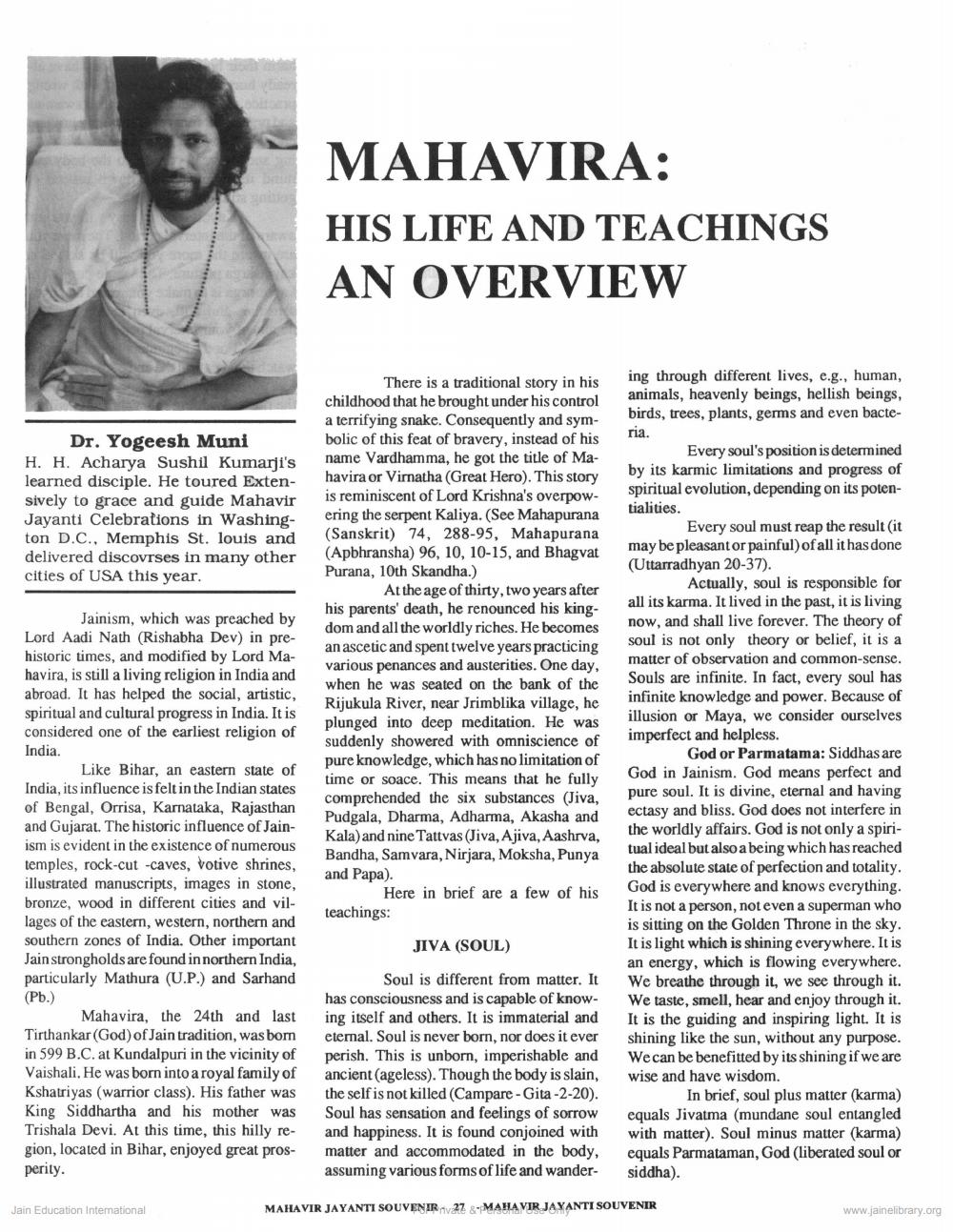________________
MAHAVIRA: HIS LIFE AND TEACHINGS AN OVERVIEW
Dr. Yogeesh Muni H. H. Acharya Sushil Kumarji's learned disciple. He toured Extensively to grace and guide Mahavir Jayanti Celebrations in Washington D.C., Memphis St. louis and delivered discovrses in many other cities of USA this year.
Jainism, which was preached by Lord Aadi Nath (Rishabha Dev) in prehistoric times, and modified by Lord Mahavira, is still a living religion in India and abroad. It has helped the social, artistic, spiritual and cultural progress in India. It is considered one of the earliest religion of India.
Like Bihar, an eastern state of India, its influence is felt in the Indian states of Bengal, Orrisa, Karnataka, Rajasthan and Gujarat. The historic influence of Jainism is evident in the existence of numerous temples, rock-cut -caves, votive shrines, illustrated manuscripts, images in stone, bronze, wood in different cities and villages of the eastern, western, northern and southern zones of India. Other important Jain strongholds are found in northern India, particularly Mathura (U.P.) and Sarhand (Pb.)
Mahavira, the 24th and last Tirthankar (God) of Jain tradition, was born in 599 B.C. at Kundalpuri in the vicinity of Vaishali, He was born into a royal family of Kshatriyas (warrior class). His father was King Siddhartha and his mother was Trishala Devi. At this time, this hilly region, located in Bihar, enjoyed great pros- perily.
There is a traditional story in his childhood that he brought under his control a terrifying snake. Consequently and symbolic of this feat of bravery, instead of his name Vardhamma, he got the title of Mahavira or Viratha (Great Hero). This story is reminiscent of Lord Krishna's overpowering the serpent Kaliya. (See Mahapurana (Sanskrit) 74, 288-95, Mahapurana (Apbhransha) 96, 10, 10-15, and Bhagvat Purana, 10th Skandha.)
At the age of thirty, two years after his parents' death, he renounced his king. dom and all the worldly riches. He becomes an ascetic and spent twelve years practicing various penances and austerities. One day, when he was seated on the bank of the Rijukula River, near Jrimblika village, he plunged into deep meditation. He was suddenly showered with omniscience of pure knowledge, which has no limitation of time or soace. This means that he fully comprehended the six substances (Jiva, Pudgala, Dharma, Adharma, Akasha and Kala) and nine Tattvas (Jiva, Ajiva, Aashrva, Bandha, Samvara, Nirjara, Moksha, Punya and Papa).
Here in brief are a few of his teachings:
ing through different lives, e.g., human, animals, heavenly beings, hellish beings, birds, trees, plants, germs and even bacteria.
Every soul's position is determined by its karmic limitations and progress of spiritual evolution, depending on its potentialities
Every soul must reap the result it may be pleasant or painful) of all it has done (Uttarradhyan 20-37).
Actually, soul is responsible for all its karma. It lived in the past, it is living now, and shall live forever. The theory of soul is not only theory or belief, it is a matter of observation and common-sense. Souls are infinite. In fact, every soul has infinite knowledge and power. Because of illusion or Maya, we consider ourselves imperfect and helpless.
God or Parmatama: Siddhas are God in Jainism. God means perfect and pure soul. It is divine, eternal and having ectasy and bliss. God does not interfere in the worldly affairs. God is not only a spiritual ideal but also a being which has reached the absolute state of perfection and totality, God is everywhere and knows everything. It is not a person, not even a superman who is sitting on the Golden Throne in the sky. It is light which is shining everywhere. It is an energy, which is flowing everywhere. We breathe through it, we see through it. We taste, smell, hear and enjoy through it. It is the guiding and inspiring light. It is shining like the sun, without any purpose. we can be benefitted by its shining if we are wise and have wisdom.
In brief, soul plus matter (karma) equals Jivatma (mundane soul entangled with matter). Soul minus matter (karma) equals Parmataman, God (liberated soul or siddha).
JIVA (SOUL)
Soul is different from matter. It has consciousness and is capable of knowing itself and others. It is immaterial and etemal. Soul is never born, nor does it ever perish. This is unborn, imperishable and ancient (ageless). Though the body is slain, the self is not killed (Campare - Gita-2-20). Soul has sensation and feelings of sorrow and happiness. It is found conjoined with matter and accommodated in the body, assuming various forms of life and wander-
Jain Education Intemational
MAHAVIR JAYANTI SOUVENIR 27 - MAHAVIR JAYANTI SOUVENIR
www.jainelibrary.org




